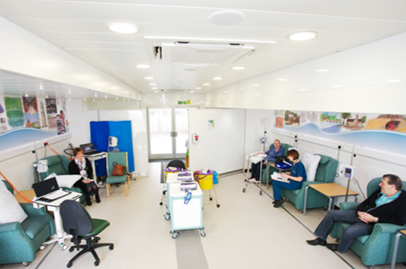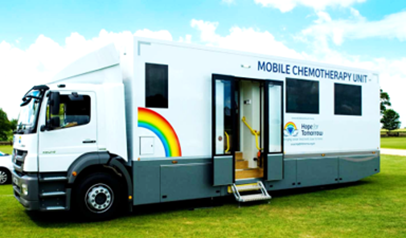Mobile Cancer Care Units - A review of Cancer Care Delivery
 Jo Quarterman
Jo Quarterman
Published 14 August 2018
 Clinical capacity
Clinical capacity
Cancer delays leaving patients at risk
As our NHS continues to be placed under pressure, the number of patients being put at risk continues to increase, discusses Suzie. Current targets mean 85% of patients are to begin treatment within 62 days of cancer being suspected. However, nowhere in the UK has achieved this for more than two years, meaning 1 in 6 patients are now waiting longer than needed to begin potentially lifesaving treatment.1 The number of people currently living with cancer is increasing by 3% each year2 and predictions show that by 2030 figures will have risen by 60%3. Taking this into consideration it’s important that steps are taken to address the increasing demands.
Cancer care pathways

The scale of expectation from our NHS is currently at an all-time high and with cancer services already struggling to meet demands it’s important that alternative resources are made available. Historically, patients have always been treated within the usual hospital setting, although when NHS England released its Five Year Forward View4, out of hospital care and care closer to home where two common themes highlighted and one way we’re seeing NHS Trusts and Charities achieving this is through the provision of mobile medical units.
When the Clatterbridge Cancer Centre had a desire to deliver their chemotherapy services closer to patients’ homes we provided them with a fully DDA complaint, 6 bay mobile chemotherapy unit that provided treatment for 25 patients per day, without compromise to the hospital setting. The service, which travelled between several supermarket locations was supported by Tesco, who provided free parking for patients, their families and the mobile chemotherapy unit. Since patients where previously travelling long distances for treatment the introduction of the mobile unit meant they were able to have access to vital treatment services locally and the service was rated comfortable, reliable and convenient by 99% of its patients.
Cancer charity Hope for Tomorrow launched its first Mobile Chemotherapy Unit in 2007. Today, the charity, in partnership with the NHS operate 10 Mobile Cancer Care Units5 that travel across the country providing vital treatment services to patients. Similarly, Welsh Cancer charity, Tenovus6 appointed us to manage the build and logistics of their first mobile chemotherapy unit in 2009. They have since gone on to operate a number of mobile units across Wales, further substantiating the need for more out of hospital and community-based services.
What the future looks like
With demand for existing NHS services continuing to be placed under strain, it’s going to become increasingly difficult for providers to meet patient demand and waiting time targets. Already as a result of the continuing pressure on our NHS, 1 in 8 patients are seeing their general health worsen while they wait for cancer treatment to start7. With this it's vital that new and innovative ways to deliver cancer care are continually explored. So far, mobile medical units have been one of the preferred options and not surprisingly when they offer the flexibility to travel between multiple locations, providing a safe and comfortable environment for patients that helps to improve their overall treatment experience. It's by continuing to utilise solutions such as mobile medical units that healthcare providers can continue to ensure more patients are not at risk.

References
1 BBC News
2 Maddams J, Utley M, Møller H. Projections of cancer prevalence in the United Kingdom, 2010-2040. Br J Cancer 2012; 107: 1195-1202. (Projections scenario 1).
3 https://www.macmillan.org.uk/_images/cancer-statistics-factsheet_tcm9-260514.pdf
4 https://www.england.nhs.uk/wp-content/uploads/2014/10/5yfv-web.pdf
5 https://www.hopefortomorrow.org.uk/
6 https://www.tenovuscancercare.org.uk/
7https://www.macmillan.org.uk/_images/warning-signs_tcm9-308400.pdf